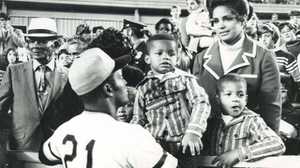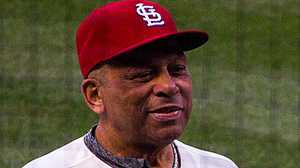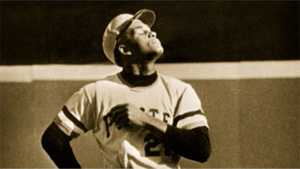Filmmaker Bernardo Ruiz
Writer/filmmaker Bernardo Ruiz works on both sides of the narrative-documentary border. He was the co-producer of the award-winning The Sixth Section, which aired nationally PBS’s P.O.V. series. Ruiz also produced Migrations, a web-based documentary project for P.O.V.'s Borders series. Here, Bernando Ruiz talks about his new film, Roberto Clemente.

What interested you about Clemente’s story?
Major league baseball and ESPN, and the commercial networks have all talked about Roberto Clemente’s baseball triumphs, and they’ve done a really good job. I think fans are familiar with his baseball triumphs. But I was interested in looking at Clemente’s interior life, his cultural impact and his significance to a wider audience.
He’s a person who’s able to inhabit multiple cultural spaces and be at peace with that. There’s a moment in the film where this professor Rob Ruck from Pittsburgh explains that Roberto Clemente was the first athlete to transcend not only race and culture, but nation. That he was really in some ways the first transnational athlete. So he was someone who was anticipating or predating a move in baseball, which was the internationalization of the game. And if you take it a step further, it’s not just baseball, but it’s really part of a larger trend. It’s a global economy, we’re all deeply connected — but yet at the same time, we struggle with that.
The final thing is that Clemente was a bona fide humanitarian. Clemente was an activist in the true sense of the word. He functioned in an era before press handlers, before publicists. He was very much an independent person, and he used his growing clout and celebrity in the world of baseball, and in Latin America and in the Caribbean, to further causes that he deeply, deeply believed in. And in fact he gave his life for one of these causes. I wanted to get at the heart of who this man was and how he impacted the times that he lived in.
As a Latino filmmaker, did you draw from personal experience to make this film?
I was born in Mexico and I came into this country when I was about five or six. I grew up in Brooklyn, New York in the 80’s, in a very mixed environment. So I strongly identify with Latino causes.
I think in some ways my role in this film is to be a translator of culture. To be in Puerto Rico, to conduct interviews with people who were near and dear to Roberto, and then to take those interviews and translate them in a way that has relevance to a larger American audience.
There were moments in my interviews with Vera Clemente, Roberto’s widow, where I felt like I was talking to one of my aunts or someone from my grandmother’s generation. I didn’t grow up in Puerto Rico, I didn’t grow up in the Caribbean. And yet there is still some cultural link there that’s important.
What was it like working in Puerto Rico?
I had the opportunity to work in Puerto Rico on several occasions for this project. I took an initial research trip where I conducted a series of pre-interviews — with the assistance of research consultant Soldanela Rivera — and spoke to friends who knew him: his wife, Doña Vera, and Luis Clemente, his son. And then we went back right around December 2007 to do actual shooting and to conduct the interviews.
Puerto Rican history is reflected in Roberto Clemente and in his family lineage. If you go to the island, and you spend some time there, and you talk to people, everyone has an opinion on how and what the status of the island should be. Currently, it’s a U.S. territory. There’s something about that cultural duality that Roberto struggled with — and eventually came to terms with.
Someone in Puerto Rico told me the story that in the homes of working class families, the Holy Trinity of photographs would be John F. Kennedy, Dr. Martin Luther King, and the third would always be Clemente. It’s really no exaggeration to say that Clemente has that icon status on the island. Everyone knows who he is and what he did, and a lot of people really view his triumphs and his history as that of their own. I know he’s really equally important to the Diaspora community, to the large Puerto Rican community and Caribbean community that lives outside of Puerto Rico.
Would you have done anything differently, if you’d had more time?
Both my co-producer, Caroline Waterlow, and I would have loved to expand the discussion of the Winter Leagues in Puerto Rico. Roberto’s later years were also really interesting to me: the early Seventies, his growing political consciousness. One thing that’s really interesting is that Dr. Martin Luther King, Jr. was one of Clemente’s heroes, and the one time we know that Dr King was in Puerto Rico, he met with Clemente. They shared a day together at Roberto’s ranch. We have not discovered any photographs or any kind of evidence of that day, but there’s something about that day that I really find intriguing. You know, to be a fly on the wall, to listen to that conversation is something that I would have loved to have explored.
What do you hope audiences will take away from your film?
I hope that people walk away with a deeper sense of the man. I think we’ve made a very unusual film. It’s an historical film on one level but it’s also a deeply spiritual film. Clemente was a deeply committed activist and humanitarian, and I hope people take that aspect of his legacy and walk away with an understanding of what’s possible.
I also hope it opens up the space for more Latino biographies, and more stories for people who are both of this country and not of this country. I think that’s an increasingly important story: people who could be considered immigrant in some light, people who are of many cultures.
Clemente was a fascinating individual and he also had a huge impact on baseball culture in the U.S., on Latin America and the Caribbean. My mother tells a story about being in Mexico and hearing the radio report of Clemente’s plane going down. She was actually pregnant with me at the time, and remembers being very aware of those days, that delay, of, “What’s going to happen to Clemente?” My mother wasn’t a baseball fan, but she was very aware of this humanitarian from Puerto Rico who was trying to do some work in Central America, in Nicaragua, around the earthquake.
Clemente is one of those people that everyone thinks they know something about. Everyone’s heard the name, there are schools named after him, there are streets named after him. He’s in the ether — and yet people don’t know his story in an intimate way.








